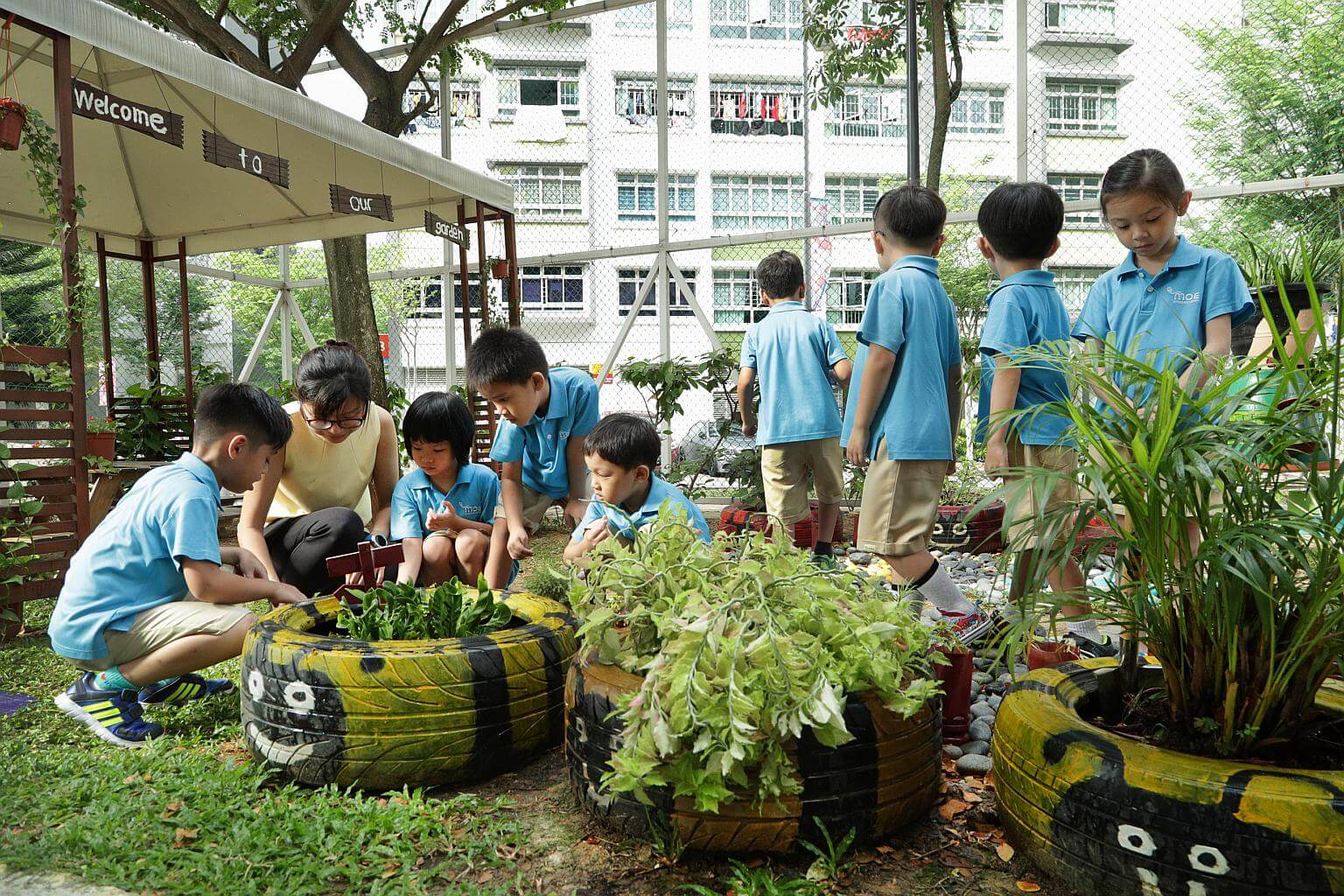Kids from 12 MOE kindergartens to get priority admission to co-located primary school: 5 questions answered
Sign up now: Get ST's newsletters delivered to your inbox

Children taking part in a gardening activity in MOE Kindergarten @ Punggol View.
PHOTO: MINISTRY OF COMMUNICATIONS AND INFORMATIONS
Fabian Koh
Follow topic:
SINGAPORE - Children attending Ministry of Education kindergartens (MK) will be given priority to enter the primary school to which their kindergarten is co-located with.
The pilot scheme, to be launched in 2018, will involve 12 kindergartens, the Ministry of Education (MOE) announced on Monday (Nov 27).
Kindergarten children applying for admission to the respective primary school will be eligible under Phase 2A2 of the Primary 1 registration scheme, which currently applies to children whose parent or siblings had studied in the primary school, but had not joined the alumni association.
Here are MOE's answers to some questions parents may have:
1. Why has MOE decided to accord MK children Phase 2A2 eligibility and not an earlier or later phase?
The Primary 1 (P1) registration framework balances different considerations, including convenience to parents, parental ties with the school, community involvement and proximity to home.
The purpose of including MK children in Phase 2A2 is to facilitate their transition into their co-located primary school as there are developmental benefits in doing so. Remaining in a familiar physical, social and educational environment for their primary school education will help smoothen their transition to P1.
With a close partnership between the MK and the primary school, the latter would also be more familiar with the needs of the MK children, and can more quickly ensure that they have the necessary developmental support when they enter P1.
Phase 2A2 eligibility for MK children will provide them with an earlier opportunity to apply for a P1 place in the primary school with the MK - before the registrants in Phase 2B and 2C, who will continue to have a minimum of 40 places ensured for them.
This will balance the intent to provide some form of priority for MK children, while maintaining open access to all primary schools.
2. Will the change lead to more pressure for P1 registration?
As demand situations differ from year to year, we are unable to predict the demand situation in individual schools and MKs.
MKs are located in areas with upcoming developments and families with young children. We expect healthy demand for these school-based MKs as well as the primary schools in that area. Nevertheless, the planned MK intake will be below that of the planned P1 intake of the MK's primary school. The number of MK children who choose to register for the MK's primary school will also vary.
As part of the pilot, MOE will monitor and evaluate the admission patterns of both MKs and primary schools.
MOE has also ensured that there are sufficient places for all the primary school-going children in these areas, regardless of the kindergarten they are from. To ensure open access to all primary schools, MOE will continue to ensure a minimum of 40 places in every primary school at Phases 2B and 2C.
3. Is the change intended to boost MK enrolment?
This move was not implemented to boost enrolment. MOE has seen and continues to expect a healthy demand for MKs, especially those located in estates with young families.
4. Does the Phase 2A2 eligibility for MK children mean non-MK children will be disadvantaged? Will there be additional P1 places available for these primary schools?
The number of P1 places available in subsequent phases depends on the number of children admitted in earlier phases, ie. Phases 1 and 2A.
Nevertheless, MOE is committed to ensuring continued open access to all primary schools, and a minimum of 40 places will still be ensured for Phases 2B and 2C in all schools.
While not everyone can be admitted to their preferred choice school, MOE ensures that there are sufficient school places on a regional basis so that no child will have to travel long distances to his or her primary school.
The new phase 2A2 eligibility for MK children will not apply to primary schools that do not have MKs.
5. Why are children from private kindergartens (affiliated to or co-located with a primary school) not accorded Phase 2A2 eligibility as well?
Phase 2A2 eligibility is accorded to only MK children as the MKs are under the direct purview of their primary school, with the MK Centre Head reporting to the Principal.
This arrangement allows the school to be in a better position to support the children coming from the MK. Remaining in a familiar physical, social and educational environment for their primary school education will help smoothen their transition to P1.
There is curricular and pedagogical continuity between the MK and the primary school, given the professional exchanges between MK and primary school educators about pre-school and lower primary curricula, pedagogies and assessment.
Private kindergartens do not have similar structural or organisational arrangements.

